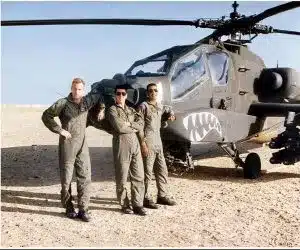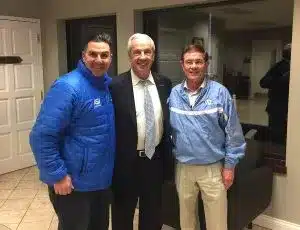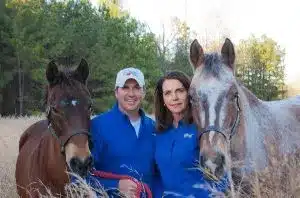Interview with an Aviator: John Foley
John Foley joined Jet Linx in August 2020 as a Citation Captain and was promoted to System Chief Pilot and Talent Acquisition Liaison in May 2021.
Foley’s aviation career began in 1987 while serving in the U.S. Army and in the 34 years since then, his roles have varied from Chief Pilot in the U.S. Army Reserve Fixed Wing program, various government contracts, and pilot and president in 135 operations and 145 repair stations before joining Jet Linx.
While Foley’s career runs the gamut in aviation, from operating Apache helicopters in the Middle East to flying legendary basketball coach Roy Williams, there’s much more to Foley than meets the eye. Perhaps the most musically-talented aviator ever featured in SOAR, Foley is also an accomplished singer and musician, and before committing to aviation was on the path to becoming an opera star.
Foley credits his successful career to powerful mentors, such as his cousins in the Bronx that joined the military and led the way for Foley to follow. As the System Chief Pilot and Talent Acquisition Liaison at Jet Linx, Foley now seeks to provide the same mentoring and wisdom to others. Read on to learn more about this multi-talented aviator!
Tell us about your background.
I grew up in the Bronx as a second-generation American with family from Ireland and Sicily. My upbringing filled me with a sense of duty to give back to the country through service. I had cousins serving in all branches of the military, including the Army and Marine Corps. In 1984, I joined the Army where I served for 29 years, spending 25 of those years flying in different capacities. Although I was the oldest of four, I had a cousin, Al, who was like an older brother to me. He enlisted in the Army and I watched him grow and succeed and eventually he entered flight school and became a helicopter pilot.
During high school, I was training to become an opera singer and instrumental musician, and I placed first in the state by my senior year for both voice and instrument. However, I was instilled with a strong desire to serve so I joined the Army as a member of the band where I played the Euphonium. I also played trombone in the Dixieland band and was the lead singer in our rock band. Within an Army band there are a number of other smaller bands that you can participate in. In addition to being in a professional band, all musicians are soldiers first and must meet all the training requirements/skills as the infantry, artillery, etc. It wasn’t just four years of band practice. I remained in the Army band until about 1987 when I decided to apply to flight school. Flight school allowed far better career prospects for me and I was ready for a change.
When did your interest in aviation begin and why?
My fascination with flying began when I was about 15 on a family trip where I was allowed to enter the cockpit of a 747. I admired the pilots, their uniforms, all the switches and controls – I just thought it was amazing that the pilots were able to control these huge, powerful aircraft. That moment for me was like when a future doctor dissects a fish in biology class. It just clicked and I knew there was something there for me. Even though I kept focusing my energy on music, my desire to fly was kept alive.
The actual decision to leave the Army band and apply to flight school came when I was pulling guard duty in Germany on a freezing night in February of 1987. I was standing outside in the cold and a helicopter came in and landed, and the rotor wash knocked me over. I had snow in my eyebrows, up my nose, in my boots, etc. I couldn’t feel my fingers or toes. After my guard duty shift, I walked into the tent where they had soup and coffee. I was feeling pretty miserable, and when I walked in, I see this guy sitting there, maybe a year or two older than me, not a hair out of place, drinking coffee, telling jokes and laughing. This was the same kid that just landed that helicopter. I remember thinking, “I want to do that, not what I’m doing now.”
Practically speaking, advancing within the band was going to be very difficult with promotions limited compared to advancing within the Army as an aviator. I still enjoyed playing music, but I enjoyed being a soldier more.

Can you describe your career path in the military?
I enlisted in the Army as a band member in 1984 and in 1987 I applied and was accepted into flight school, where I graduated as a helicopter pilot and worked hard enough and was fortunate enough to be selected as one of six Apache helicopter pilots in my class. I flew the Apache from 1988 to 2000, and in 1996 I became a Chief Pilot for an Apache helicopter battalion. I was responsible for leading and training a cadre of other instructor pilots as well as being the subject matter expert and advisor to the commander. A typical Apache Helicopter Battalion at that time had 24 aircraft and 60 pilots.
In 1999, I had the opportunity to attend Army’s Fixed Wing course after which I was qualified in the C-12; the military designation for the King Air 200. A few years later I attended the Fixed Wing Instructor Pilot course and the UC-35 qualification (the military designation for Citation Ultra/Encore). I flew these aircraft from 2000 until my retirement in 2013 and spent my last three years as a Chief Pilot for Army Reserve Fixed Wing program. I was responsible for the training of approximately 150 pilots located in the U.S. and abroad. This involved both 135-like and reconnaissance missions. I participated in several campaigns such as Desert Shield, Desert Storm, Bosnia, Operation Iraqi Freedom, Operation Enduring Freedom and Haiti Humanitarian efforts.
Immediately following my retirement in 2013, I worked as a Senior Instructor Pilot and Maintenance Test Pilot for a government contractor, before transitioning into a project management role for a company that supported the Taiwan army and their purchase of Apache and Blackhawk helicopters. From 2014 to 2017, I was responsible for the budget, hiring, recruiting, onboarding, management and other duties for that company. At the same time, I also flew Citation jets and helicopters for an oil company.
My next role came as the General Manager of a repair station and FBO. Shortly after I started my role, the person running the operation stepped down and I was fortunate enough to be asked to fill the role of President. I occupied this role from 2017 to 2020 while performing Charter Captain duties in the Citation 550 Bravo. Then in 2020 when the pandemic hit, my wife and I decided it was time to return home to Central Texas where we could be closer to family.
To what do you attribute your success?
Upon leaving the military, a lot of guys will try a range of different jobs and I did the same thing for a few years. During those transitional years, I learned many valuable non-flying skills. To succeed in the military, you must master self-discipline, time management, and attention to detail while working as a team to accomplish the mission.
I was fortunate enough to learn from incredible mentors and teachers along the way and I would be nowhere without their help. I don’t let my success define me – but I am proud of the fact that I worked very hard and took advantage of being led and mentored well. It’s my job now to pay it back and allow someone else to grow, which I very much enjoy in my current role.
Most importantly, I must also credit my wife – she has been my biggest supporter and cheerleader, following me literally around the world for almost three decades. She often had to assume the role of mom and dad during my many deployments and training events. She took care of much of the household duties for many years without complaint – only offering me help and support. For that, and her undying belief in me, I am forever grateful!
What attracted you to come work for Jet Linx?
In my previous capacity as the President of the repair station and charter company, I had several meetings with the Jet Linx Indianapolis Base leadership; I was impressed with the atmosphere and the dedication in the team members I encountered. I could see that the culture at Jet Linx was not just words on a wall, but values that are played out every day.
As we were preparing to move back to Texas, I saw an opening for a Citation Captain in Fort Worth. I was absolutely impressed with every step of the process from initial contact to onboarding and indoc and training. Jet Linx possessed all of the cultural and technical attributes that my former company was in the process of building, so I knew it would be a great fit.

What is your favorite aspect about your job as a pilot?
I enjoy seeing incredible formations of clouds, mountains and oceans; there are never two flights that are the same. It also affords some really one-of-a-kind opportunities, such as flying legendary North Carolina basketball coach Roy Williams. He is a singularly outstanding man; kind, authentic focused, and always willing to sign an autograph or take a picture. You cannot find opportunities like that in other fields of work. Being a pilot is a unique job that offers many incredible experiences.
What do you enjoy most about your role as System Chief Pilot (SCP)?
It’s an incredible honor to have been selected as one of the SCPs. To those who wonder if there is advancement within Jet Linx, I say unequivocally YES! I am excited to work with our talent team as they made a fantastic impression on me from the time I was contacted after applying for a PIC position until today. They work tirelessly, always moving things forward.
While I do enjoy flying, I am passionate about leadership and love being challenged with new opportunities and projects. Leading people is a passion because I was given the opportunity to be mentored by some very incredible leaders. My job is to help others succeed, just as others have helped me, and I think my role allows me to do that in several different ways.
What is your favorite aspect about the Jet Linx culture and safety focus?
Our culture is alive; there is evidence of it at all 20 Bases and in the people that work here. Our core values don’t just line the walls, they guide our team to perform at a consistently high level. Everyone here values people, and that’s what makes a company great – its people and their commitment to doing things right, helping one another and striving each day to become better.
Our safety culture is the best I’ve ever encountered. Again, not just words on a wall but rather how we operate every single day. This is evidenced by the Safety Summit and Safety Symposiums, as well as the ongoing recertifications from Wyvern, ARGUS and IS-BAO. Few other operators would take the time or money to invest in safety like we do, and that’s what makes Jet Linx an industry leader in part 135 operations. I also believe that a strong safety culture reflects on how a company values its employees and clients, and I think Jet Linx takes safety seriously because there is a ton of value placed on people, not resources or revenue.

What’s something people might not know about you?
My wife and I run a nonprofit called Horses That Heal. It began in 2011 when we lived in North Carolina and had a 20-acre horse farm and a herd of about 13 horses. We now have a location in Belton, Texas, with two horses. We provide equine-assisted psychotherapy and learning to active-duty soldiers, veterans and their families. I’m actually a certified equine specialist for a treatment model that uses horses to improve mental health. My wife, Deborah, is a licensed mental health counselor, an equestrian, and the founder and Executive Director of the organization.
This treatment is part of the Eagala Model, a team approach that includes a licensed, credentialed mental health professional, a qualified equine specialist, and horses working together with the client at all times. When inside the arena, all the work is done on the ground with the horses front and center, deliberately unhindered and never ridden, and allowed to interact with the client as they wish. This creates the space for the client, with the support of the professional facilitators, to reflect, project, and make deep connections.
Related Stories
Celebrating the Women of Jet Linx
In celebration of Women’s History Month, Jet Linx proudly presents the stories of some the women in our leadership and those excelling in the cockpit.
READ MORE
Celebrating 25 Years: The Inception
From inception to the present – Jet Linx was built to be your partner in private aviation.
READ MORE
Interview with an Aviator: Victor Alvarez
In the latest installment of Interview with an Aviator, we sat down with Victor Alvarez, Jet Linx Boca Raton Pilot.
READ MORE
Related Stories
Celebrating the Women of Jet Linx
In celebration of Women’s History Month, Jet Linx proudly presents the stories of some the women in our leadership and those excelling in the cockpit.
READ MORE
Celebrating 25 Years: The Inception
From inception to the present – Jet Linx was built to be your partner in private aviation.
READ MORE
Interview with an Aviator: Victor Alvarez
In the latest installment of Interview with an Aviator, we sat down with Victor Alvarez, Jet Linx Boca Raton Pilot.
READ MORE



Contact Us